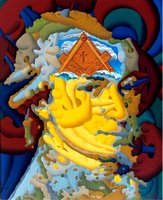 Born 250 years ago today, on January 27, 1756, the boy who grew up to become our Brother Wolfgang Amadeus Mozart began exhibiting his musical prowess at the age of three. He received intensive musical training from his father on many instruments.
Born 250 years ago today, on January 27, 1756, the boy who grew up to become our Brother Wolfgang Amadeus Mozart began exhibiting his musical prowess at the age of three. He received intensive musical training from his father on many instruments.Soon young Amadeus was on tour, showcasing his musical talents by playing blindfolded. He became quite accomplished and spent much of his childhood traveling Europe as a Wunderkind, performing for royalty and emperors, even playing the Sistine Chapel.
He befriended many musicians, including Johann Christian Bach, son of composer Johann Sebastian Bach. He wrote several songs to be played on our Brother Benjamin Franklin's invention, the glass harmonica.
During 1782–83, Brother Mozart became closely acquainted with the work of J.S. Bach and Georg Frideric Handel as a result of the influence of Baron Gottfried van Swieten, who owned many manuscripts of works by the Baroque masters. Mozart's study of these works led first to a number of works imitating Baroque style and later had a powerful influence on his own personal musical language, for example the fugal passages in Die Zauberflöte ("The Magic Flute") and the Symphony No. 41.
The Magic Flute was his Masonic opera, ripe with Masonic symbols and allegory. Wikipedia says of The Magic Flute:
The opera is often noted for its Masonic elements, which are rife and often elaborate. Both Brother Schikaneder and Brother Mozart were Masons and lodge brothers. In the political climate of the times, Freemasonry was considered a dangerous organization. Many of the opera's ideas and motifs also echo those of Enlightenment philosophy: It is an analogy to the zeitgeisty enlightened absolutism. The Queen of the Night represents the irrational-diabolic obscurantism, her antagonist Sarastro symbolises the reasonable sovereign who rules with paternalistic wisdom and enlightened insight. In the end he prevails over the darkness ("The sun's rays drive away the night, destroy the evil power of the dissembler"). But the the darkness is by no means frightening and abhorrent, but beautiful, mysterious and fascinating. As an awesome seductress the Queen of the Night is a dangerous power who can only be overcome by knowledge.
Brother Mozart was influenced by the ideas of the eighteenth century European Enlightenment as an adult, and became a Freemason in 1784. His lodge was a specifically Catholic rather than a deistic one and he worked fervently and successfully to convert his father before the latter's death in 1787. He was in the same Masonic Lodge as composer Franz Joseph Haydn.
Brother Mozart died in 1791, while working on his final composition, Requiem. The exact cause of his death is unknown; many theories have been suggested, including trichinosis, mercury poisoning, and rheumatic fever.
Grok on, Brother Amadeus!
Music | Mozart | Freemasonry
No comments:
Post a Comment
Note: Only a member of this blog may post a comment.